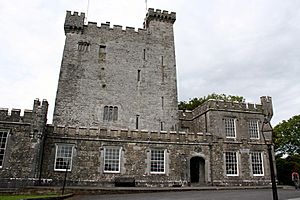Knappogue Castle facts for kids
Quick facts for kids Knappogue Castle |
|
|---|---|
| Caisleán na Cnapóige | |
| County Clare, Ireland | |

Knappogue Castle
|
|
| Coordinates | 52°47′38″N 8°49′54″W / 52.793919°N 8.831597°W |
| Site information | |
| Owner | Shannon Heritage |
| Open to the public |
yes |
| Site history | |
| Built | 1467 |
| Built by | Seán Mac Conmara (MacNamara) |
Knappogue Castle (in Irish: Caisleán na Cnapóige) is an old castle located in County Clare, Ireland. It was built way back in 1467. Over the years, especially in the mid-1800s, it was made bigger.
This castle is a great example of a "tower house." This means it's a tall, strong building that was used as a home and for defense. Today, Knappogue Castle has been carefully fixed up. You can visit it and take a guided tour to learn all about its history.
Contents
History of Knappogue Castle
Building the Castle
The first part of Knappogue Castle was built in 1467. It was built by a man named Seán Mac Conmara, whose family name was later changed to MacNamara. The castle's name, "Knappogue," means "castle of the place with many small hills."
MacNamara Family and Conflicts
By 1571, Knappogue Castle became the main home for a branch of the MacNamara family. They were known as the Earls of West Clancullen.
During the Irish Rebellion of 1641, a MacNamara leader named Donnchadh Mac Conmara was involved. The castle stayed with the MacNamara family through the Irish Confederate Wars in the 1640s. These were times of big conflicts in Ireland.
After the Cromwellian conquest of Ireland (from 1649 to 1653), the castle was taken away from the MacNamaras. This happened because of a law called the Adventurers' Act. The new owner was a man named Arthur Smith, who was part of the "Roundhead" side during the English Civil War.
Arthur Smith lived in the castle from 1659 to 1661. But after the king was put back in power in 1660 (this was called the Restoration), Knappogue Castle was given back to the MacNamara family.
New Owners and Renovations
Later, in 1800, Francis MacNamara sold the castle to the Scott family. The Scotts started a big project to fix up and expand the castle. In 1837, William Scott owned the castle.
In 1855, the castle was bought by Theobold Fitzwalter Butler, who was the 14th Baron Dunboyne. It became the main home for the Dunboyne family. They continued the restoration work that the Scotts had started. They added a drawing-room, a long room, and a west wing. This new wing included a clock tower and a grand gateway. Architects James Pain and his brother George Richard Pain designed these changes.
Knappogue During the War of Independence
During the War of Independence (from 1919 to 1921), Knappogue Castle played an important role. The local government, Clare County Council, held their meetings there. They were protected by a group of fighters called the East Clare Flying Column. Michael Brennan, who was the leader of the East Clare Brigade, also used the castle as his main base during this time.
Modern Restoration and Public Access
In 1927, the land around Knappogue Castle was bought by the Irish Land Commission. The castle itself then became owned by the Quinn family.
Later, in 1966, an American named Mark Edwin Andrews bought the castle and its lands. He was a former Assistant Secretary of the United States Navy. He and his wife Lavonne, who was a famous architect, worked with Irish tourism groups. They did a huge restoration of the castle around 1969. Their goal was to make the castle a restaurant and a private home.
Their hard work brought much of the castle back to how it looked in the 1400s. But they also kept the newer parts that showed how the castle had been lived in continuously. The Andrews family later leased part of the castle to the Irish Government. They charged a very small rent so the castle could be used for cultural events and tourism.
Knappogue Castle Today
In 1996, Shannon Development bought the castle. Today, Knappogue Castle is a popular place for many events. It is often used for weddings and special medieval banquets, where people can experience a feast like those from long ago. You can also still take guided tours to explore the castle and learn about its past.
Castle Gardens
The castle also has beautiful gardens that date back to 1817. These gardens have been carefully restored to their original beauty. The garden walls are now covered with climbing roses, grapevines, and many different kinds of clematis flowers. It's a lovely place to walk and enjoy nature.
Knappogue Castle Whiskey
There is even a type of Irish whiskey named "Knappogue Castle." It is produced by the Castle Brands company.
 | Kyle Baker |
 | Joseph Yoakum |
 | Laura Wheeler Waring |
 | Henry Ossawa Tanner |


